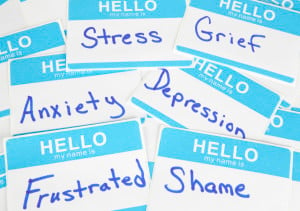Back when I still had a car, I was driving down the highway one day and saw something most peculiar in the other direction: In stand-still traffic, a grown man had gotten out of his car and was at the window of another grown man’s car.
Grown Man #1 was yelling and gesturing with all his might. Grown Man #2 was staying in his car, refusing to roll down the window, and quite literally plugging his ears and making the “la la la la la la la!” mouthing motions, complete with an eye roll.
Folks, this is essentially what it feels like when you take on controversial conversations on any given day when you (and/or your recipient) aren’t quite feeling it.
Sure, the racial slur or transphobic comment the person before you just uttered will certainly set your blood on fire, but is it always wise to engage them?
No. No, it’s not.
The primary success of opening the minds of others isn’t so much how great your arguments are, but how great you are at actually implementing them.
On top of that, political inspiration is a two-way street. That is, your recipient has to willingly entertain the notion of being inspired.
If you’re hungry and cranky or your recipient is an ass, chances are your conversation isn’t going to go anywhere.
In the end, working out when to battle, which battles to pick up, and when to let battles go can be the true mechanisms for succeeding in the battles you choose to take on.
Don’t feel guilty because you don’t jump at every single chance to combat someone whose beliefs are different from your own. Even if you feel your beliefs are right. Even if you feel your beliefs could save lives.
The sad fact of the matter is there will simply be people who are lost causes and simply times when the battle can’t be won. Not by an inch.
So wasting your time will only further deplete your personal resources, and learning when it is and isn’t a good time to strike will ultimately be a mental lifesaver.
Basically, don’t feel bad about being choosy. Political upheaval may hang in the balance for an entire group of people, but you ultimately always have to think of yourself first.
And to do that, there are five simple questions you can ask yourself before engaging with a problematic person.
1. How Are You Feeling Right Now?
Self-care is important in this world, but unfortunately often neglected. From the harried single mother of four to the college student working three jobs so they can assist their family in their poverty, the theory is pretty simple: If you don’t take care of yourself first, all those who depend on you will fall just as soon as you do.
Or, as the airline safety tip goes, put your own oxygen mask on first. Not your kid’s, not your grandfather’s. Yours. Because if you’ve passed out, who the hell is going to do it for them in a moment of panic?
In that vein, when somebody says something problematic in front of you, your first line of defense should be a self-check:
- Are you currently tired, hungry, or feeling stressed (from factors outside of the current conversation)?
- How many battles have you attempted in controversial matters this week?
- Is this conversation happening in a place of emotion, either for you or the recipient?
Change can’t happen unless both you and your recipient are in a position to invite change.
If you’re tired, hungry, or cranky, it’s incredibly likely you’ll do a less-than-awesome job convincing somebody on some pretty heavy things. And the fact of the matter is if you want to convince somebody on some pretty heavy things, you need to be doing an awesome job. There’s absolutely no wiggle room on that. Bring your A game or go home.
The same goes for emotionality.
While emotionality can be helpful in some situations, it’s frequently read as irrationality in political (i.e. “logical”) conversations.
And if somebody pegs you as irrational, every single thing out of your mouth will result in a piteous eye roll from the other party.
On the flipside, if your recipient is emotional, they likely will shut you down in every avenue you try to take purely because they don’t want to hear what you have to say.
In the end, the only result you’ll have is that you’re 30 minutes hungrier than you were before.
2. What Are the Potential Backlashes to Engaging This Battle?
Being ostracized? Okay. Losing a fair-weather friend? Fine. Ending a business relationship or two? Whatever.
Battles come with risks. That’s why they’re battles.
But sometimes the risks aren’t worthwhile or are otherwise completely out of proportion to the good that may be done.
And to weigh such potentials, it’s best to ask yourself questions such as below:
- What is your relationship to this person?
- Is there a power dynamic in play?
- Could you find yourself in any physical, emotional, or financial danger?
Basically, if you could lose your job (legally or not, it’s hard to prove it), be demoted, be assaulted, or no longer be welcome at Thanksgiving, it may be best to let it go (unless the turkey was always dry, anyway.).
Unfortunately, power and numbers are power and numbers. It’s rare for a singular person of little financial significance to successfully take those bad boys on.
In these kinds of situation, the best-case scenario is no change is made. The worst-case scenario is no change is made and you yourself are worse off than you were before. And if you’re worse off than you were before, then it’ll be that much more difficult for you to help others.
3. What’s Your Current Environment?
Changing someone’s mind on some emotionally strong content is a tough thing to do.
If you’re up for the challenge, make sure you’re not walking down the street, standing around in a highly public place, or are otherwise in an environment that’s distracting to your senses.
Rather, try to find a place to sit down comfortably that’s quiet, where you won’t have to leave in 20 minutes because you’re taking up valuable space for other patrons.
When somebody says something problematic, take a quick environmental check before bouncing back with some hard topics:
- Are you in a space that invites conversation?
- Are you in a space where you won’t be interrupted?
- Is there an audience, potentially prompting your recipient to rebuttal you purely to save face?
If possible, try to meet your recipient on ground that makes them feel more comfortable while not putting you out too much on your own comfort level.
If you know coffee houses relax them, take them to one to talk. If they’re a hardcore conservative, it might be best to decline their invitation to continue your discussion of transgender bathroom rights at a Young Republicans meeting.
Pick a place where the power dynamic is as equal as possible.
Controversial conversations are intended to be a discussion of logic and beliefs between two people who hopefully come to an agreement, not a power battle to see who caves first due to threats or pressure.
If there’s no opportunity to move yourselves to an ideal location for discussion, then a discussion shouldn’t be had. Either invite them to talk about this at a later date, or just don’t bring your stance up at all.
4. Exactly How Important Is This Particular Battle?
Don’t get me wrong: Every person counts when it comes to convincing enough people to create change.
However, there are also plenty of circumstances in which letting an individual go is simply the wiser choice in the grand scheme of things.
If you have the time and energy, feel free to jump on anybody’s silly statements and try to show them why they may want to rethink their beliefs.
But if you’re not feeling it, it’s time to start prioritizing your battles with people based on their importance:
- If you could categorize the severity of the recipient’s problematic opinion(s) on a scale of 1-10, what would it be?
- How closely related is this person to the topic? Is there a way to draw them in closer or have them start feeling personally invested in bettering their behavior?
- Does the recipient seem to be in an open-minded state of being?
- Will their stance be soon followed by some sort of action (e.g. stealthily firing an employee for their identity or trying to pass a law that makes it legal to shoot gay people)?
If the person’s known for being a privileged imp who enjoys shit stirring, pass them by. If they simply spout nonsense without ever working toward making their beliefs a reality, ignore them. If they are low on the totem pole of political change (e.g. not a politician or someone of money or power), let them go.
They’re simply not worth your time.
5. What Change Can You Make Instead of Arguing with This Person?
Now that you recognize that this particular battle isn’t worth your while, what’re you to do? You’re still seething, right?
Essentially, the best way to let things go when you’re pumped is to redirect your energy to something more constructive. In this situation, make it about the identity group your problematic person slurred.
If they said something mean about people who are homeless, go volunteer at a soup kitchen. If they believe restaurants have the right to refuse service to gay people, start up a campaign that encourages (nice or Switzerland) restaurants to give a small discount to LGBTQIA+ customers as a way of making a point.
Do these things produce the same exact result as if you successfully engaged a bigoted mind? No. But they do nonetheless succeed in something that you would have otherwise been unable to do if you were just arguing in a circle: helping people.
And isn’t that ultimately why you’re fighting your fights?
***
In the end, I’m not saying that battles shouldn’t be fought unless they’re incredibly easy or lack any sort of risk. Then they’re not battles.
What I’m saying is there’s a threshold when it comes to engaging in controversial conversations. Every person has their own mental limit when it comes to fighting, and once you hit that limit, you’re not doing anybody any favors by trying to push on.
If you’re exhausted, you risk making a bad argument and having your rival may walk away feeling they’re right in their stance. And you’re simply left feeling even more exhausted than before and probably even a bit like a failure. That’s not cool.
Take care of yourself, and take care of your beliefs. There’s absolutely nothing wrong with occasionally backing off purely for your own well-being.
Because after all, if you don’t help yourself, how are you going to help others?
[do_widget id=”text-101″]
James St. James is a Contributing Writer for Everyday Feminism. He isn’t particularly fond of his name, but he has to admit it makes him easier to remember. When he’s not busy scaring cis gender people with his trans gender agenda, he likes to play SEGA and eat candy.
Search our 3000+ articles!
Read our articles about:
Our online racial justice training
Used by hundreds of universities, non-profits, and businesses.
Click to learn more





















